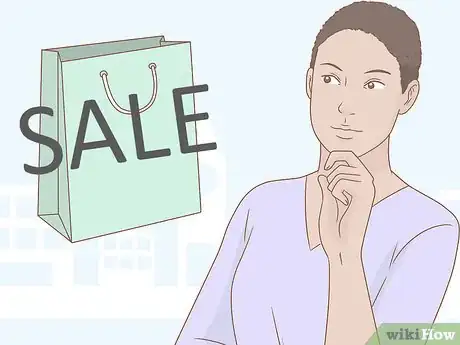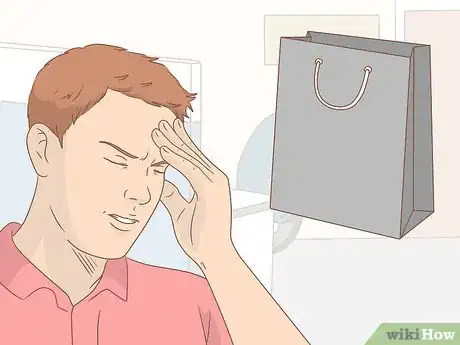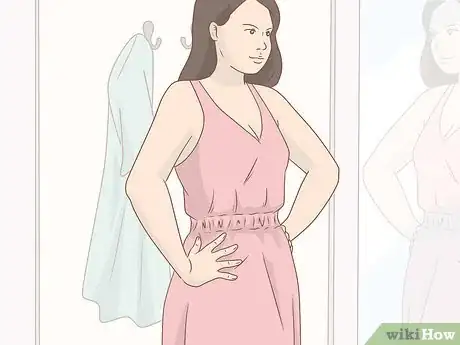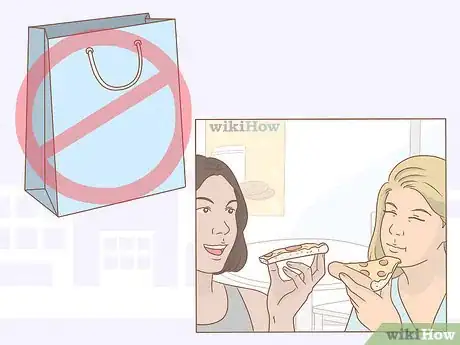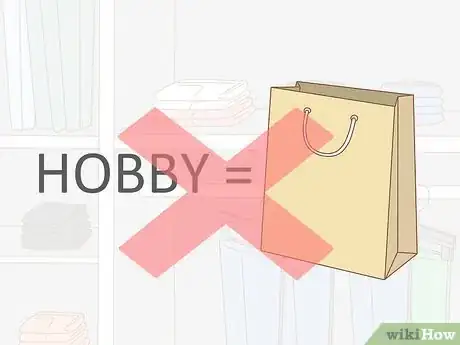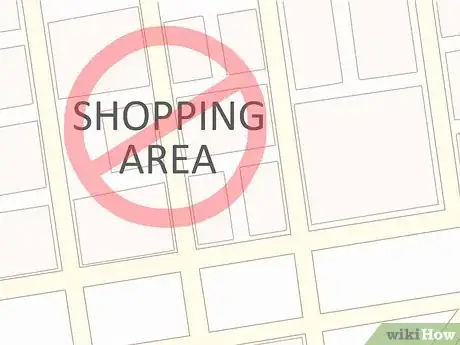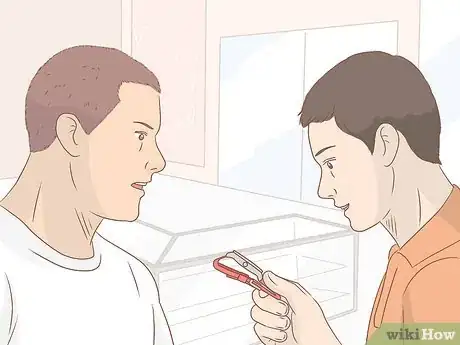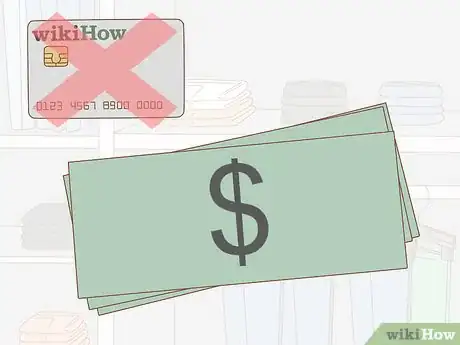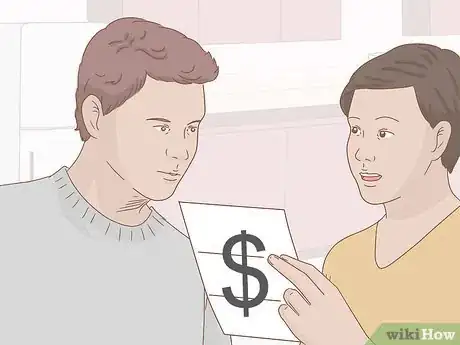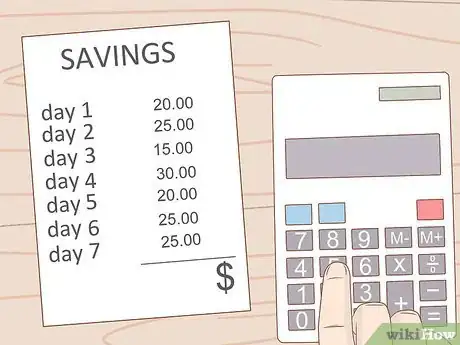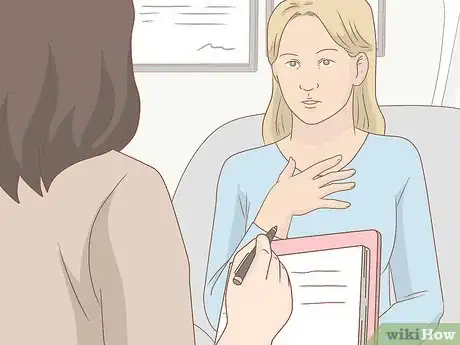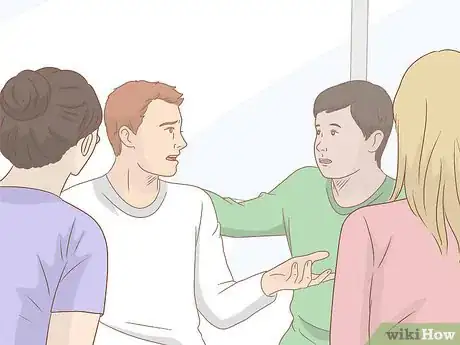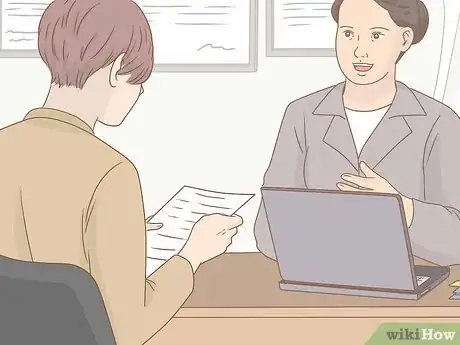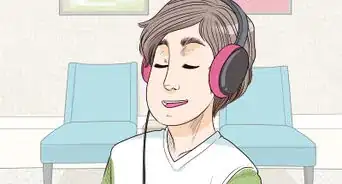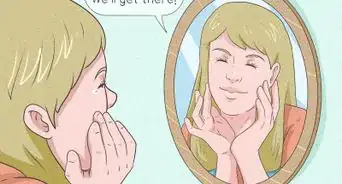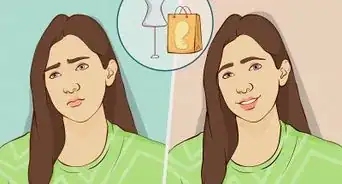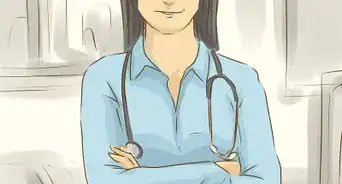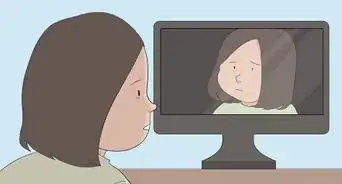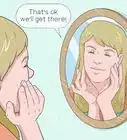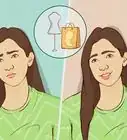This article was co-authored by Klare Heston, LCSW. Klare Heston is a Licensed Independent Clinical Social Worker based in Cleveland, Ohio. With experience in academic counseling and clinical supervision, Klare received her Master of Social Work from the Virginia Commonwealth University in 1983. She also holds a 2-Year Post-Graduate Certificate from the Gestalt Institute of Cleveland, as well as certification in Family Therapy, Supervision, Mediation, and Trauma Recovery and Treatment (EMDR).
This article has been viewed 35,140 times.
You may struggle with compulsive shopping, using it as a means to feel better when anxious, upset, tired, or overworked. There are many possible voids you may try to fill through shopping, such as boredom, self-esteem issues, or compensation for relationship issues. You can curb your urge to compulsively shop by taking steps to recognize its root causes and taking steps to stop the habit.
Steps
Learning Why You Are a Shopaholic
-
1Identify the type of shopper you are. You can overcome compulsive shopping by recognizing what motivates you to act and working to stop the problem at its root. The most common type of shoppers are:
- Compulsive shopaholics shop to assuage emotional problems.
- Trophy shopaholics look for top items to add to their collections.
- Some shopaholics seek the flashy appearance of material affluence through new things.
- Bargain seekers are those who justify purchases based on sales and good deals.
- Bulimic shoppers are those who get caught in a guilt cycle of buying and returning.
- Collectors who feel they need every item in a particular set to complete a collection.
-
2Know if you shop when stressed. People tend to shop to relieve stress. You can help get to the root of issues by observing your stress level when you choose to shop. It can also help deconstruct that shopping does little to actually relieve stress. After all, how stress-reducing is it to worry about whether or not your credit card will be refused, and how much it is mounting up? If you shop when you are stressed, you are more likely to make impulse decisions to stop the feeling.
- Take notice of your triggers and emotions. Shopaholics tend to shop in response to certain emotional states, such as negative emotions, boredom, for a thrill, or to fill a void. Triggers, when recognized, can help stop destructive behaviors before they start.
Advertisement -
3Recognize the link between shopping and self-esteem issues. Shopaholics often use purchases to deal with self-esteem issues. These purchases can be clothing that makes you look better, or new things for the sake of keeping up on appearances. Write down how you feel after making a new purchase. Observe if you feel more confident, or other emotions that address self-esteem issues.
- Materialism and competition in a consumer based society can exasperate these issues. Shopping is seen as a more acceptable behavior than other addictions like drugs or alcohol. Avoid using your possessions as a measure of success or to compare to others. [1]
Finding Ways to Fill the Void
-
1Avoid making shopping a social activity. Shopaholics often make shopping a central social activity to do with friends and family. You may find yourself shopping to celebrate a big promotion or after a bad day. Find others way to cope. Go out to eat with friends,to a movie, or a museum. You will still have the comfort of social connections without relying on shopping. [2]
- Don't let shopping be a reward or a way to deal with bad days. If you have a bad day, call a friend, partner, or family member and let them help you cheer up. If you have some extra money to celebrate, put the money away and rejoice in the good feeling when all that savings adds up.
-
2Stop viewing shopping as a hobby. A hobby is something that should fulfill you and make you feel satisfied. Shopping offers little long-term fulfillment. It is also harder to match that feeling each time, so you feel compelled to buy more. What sort of hobby leaves you feeling so compelled and tied up? Unless your shopping habit is truly giving you a long-term sense of satisfaction and enrichment, it's not a hobby.
- Find a real hobby and substitute that for the shopping hobby. Try substituting physical activities or something that gives you a rush instead of shopping.
- When you do need to head out to shop, consider doing some exercise or participating in another hobby before you go out.
-
3Change your environment. You are much more likely to do impulsive, emotion-based shopping if it's available to you. Create off-limit zones that may trigger your desire to shop, such as malls, shopping areas, and other stores. Don't allow any ambiguity, such as a grocery store within your forbidden zone, to help reduce lapses.[3]
- This should apply to your internet life, too. Don't go to shopping websites, even if it's just to look, and unsubscribe to e-mails from your favorite stores and companies. You may even consider decreasing your overall time online to avoid ads and pop-ups.
-
4Bring a friend or family member with you shopping. Accountability and transparency are key to breaking a shopping habit. Take someone, a shopping support buddy, with you when you shop. They can help keep you on task and prevent any binge purchases.[4]
- Even if you're alone, texting or calling a friend while shopping, can be useful. You can tell them what you're purchasing and they can offer an outside perspective.
Controlling Your Spending Habits
-
1Avoid using anything but cash. Credit gives someone the ability to spend more than they have at any given moment. Shopping exclusively with cash will keep your purchasing power limited. Take only the cash you need to buy specific items you need. [5]
- Wait before making a purchase. It can help to wait until the rush of the impulse wears off and you can really think about whether you need the item. If you see something you want, give it until the next day then reassess whether you still want it.
- Leave your wallet at home. Take only your driver's license or public transportation pass and the exact amount of cash, no more.
-
2Be transparent with bills and credit habits. Many people who shop for emotional reasons are able to secretly run up mass amounts of debt. It is important that you are transparent about your spending to make your shopping habit accountable. Let a friend, or even better a partner, keep track of your spending and go over credit card bills to see where you may be straying.
-
3Make a list of your savings. At the end of a week of not shopping, look at all your savings. Focus on tangible results to help positively reinforce smart shopping. Shopping can have a snowball effect: shopping to fill an emotional void followed by guilt for shopping. Create a positive out of a negative by dwelling on your savings after a successful period of not shopping.
- You should be clear about your budget. This will play into your savings, as well. Create certain amounts of money you are allowed to spend on non-essential purchases and have others help keep you accountable so that you don't go over your budget.
Seeking Outside Help
-
1Find a therapist to help. A therapist can help you manage your shopping and address the underlying causes. There are no standardized methods, and medicines aren't likely to be subscribed, but the therapy should aim at helping you regulate and control your urges.[6]
- Cognitive behavioral therapy is sometimes very helpful. This aims are to deconstruct why shopping is used for emotional reasons. This can also be done in a group setting so that you can use others with the same problems for support.[7]
-
2Look for group help. Group therapy is a great option to provide support and structure for a shopaholic. In a group setting, you are amongst people who suffer similarly to you, and can help provide coping methods.[8]
- There are a number of twelve-step and group options available. Shopaholics Anonymous is one option that provides counseling and group therapy options. Spenders Anonymous is a twelve-step group based on the principles of Alcoholic's Anonymous. They strive to help individuals take control of their shopping and seek other coping methods.[9]
- There are also online options available. The most famous is Overshopping which provides forums and self-help techniques. This way if you want [10]
-
3Seek out credit counseling. A credit counselor can help evaluate and curb the toll shopping takes on your finances. A credit counselor can make the debt you've accrued more manageable and help alleviate some of the guilt.[11]
- This is important because you are trying to manage the emotional reasons that cause you to shop too much. If you are feeling guilty from your debt, this can cause a relapse.
Expert Q&A
-
QuestionHow do I stop emotional shopping?
 Klare Heston, LCSWKlare Heston is a Licensed Independent Clinical Social Worker based in Cleveland, Ohio. With experience in academic counseling and clinical supervision, Klare received her Master of Social Work from the Virginia Commonwealth University in 1983. She also holds a 2-Year Post-Graduate Certificate from the Gestalt Institute of Cleveland, as well as certification in Family Therapy, Supervision, Mediation, and Trauma Recovery and Treatment (EMDR).
Klare Heston, LCSWKlare Heston is a Licensed Independent Clinical Social Worker based in Cleveland, Ohio. With experience in academic counseling and clinical supervision, Klare received her Master of Social Work from the Virginia Commonwealth University in 1983. She also holds a 2-Year Post-Graduate Certificate from the Gestalt Institute of Cleveland, as well as certification in Family Therapy, Supervision, Mediation, and Trauma Recovery and Treatment (EMDR).
Licensed Social Worker Identify your triggers—what precedes your impulsive shopping? Try different behaviors like writing in a journal or talking with a friend when having a trigger. Discuss your problem with someone. Avoid shopping malls or your computer or cellphone when experiencing a trigger.
Identify your triggers—what precedes your impulsive shopping? Try different behaviors like writing in a journal or talking with a friend when having a trigger. Discuss your problem with someone. Avoid shopping malls or your computer or cellphone when experiencing a trigger. -
QuestionHow do I stop Internet shopping?
 Klare Heston, LCSWKlare Heston is a Licensed Independent Clinical Social Worker based in Cleveland, Ohio. With experience in academic counseling and clinical supervision, Klare received her Master of Social Work from the Virginia Commonwealth University in 1983. She also holds a 2-Year Post-Graduate Certificate from the Gestalt Institute of Cleveland, as well as certification in Family Therapy, Supervision, Mediation, and Trauma Recovery and Treatment (EMDR).
Klare Heston, LCSWKlare Heston is a Licensed Independent Clinical Social Worker based in Cleveland, Ohio. With experience in academic counseling and clinical supervision, Klare received her Master of Social Work from the Virginia Commonwealth University in 1983. She also holds a 2-Year Post-Graduate Certificate from the Gestalt Institute of Cleveland, as well as certification in Family Therapy, Supervision, Mediation, and Trauma Recovery and Treatment (EMDR).
Licensed Social Worker Limit the amount of time you spend online. Tell your closest friends not to email or text you for a while so you can safely avoid your devices. Unsubscribe from the sites you fall prey to or ask a friend go online and do that for you.
Limit the amount of time you spend online. Tell your closest friends not to email or text you for a while so you can safely avoid your devices. Unsubscribe from the sites you fall prey to or ask a friend go online and do that for you. -
QuestionWhy does shopping feel so good?
 Klare Heston, LCSWKlare Heston is a Licensed Independent Clinical Social Worker based in Cleveland, Ohio. With experience in academic counseling and clinical supervision, Klare received her Master of Social Work from the Virginia Commonwealth University in 1983. She also holds a 2-Year Post-Graduate Certificate from the Gestalt Institute of Cleveland, as well as certification in Family Therapy, Supervision, Mediation, and Trauma Recovery and Treatment (EMDR).
Klare Heston, LCSWKlare Heston is a Licensed Independent Clinical Social Worker based in Cleveland, Ohio. With experience in academic counseling and clinical supervision, Klare received her Master of Social Work from the Virginia Commonwealth University in 1983. She also holds a 2-Year Post-Graduate Certificate from the Gestalt Institute of Cleveland, as well as certification in Family Therapy, Supervision, Mediation, and Trauma Recovery and Treatment (EMDR).
Licensed Social Worker Whatever we are addicted to makes us feel better. For some people, it is smoking or drinking, for others, it's shopping. It temporarily takes our focus off of the upsetting thought or memory. But in the longer run, it does not have lasting effects.
Whatever we are addicted to makes us feel better. For some people, it is smoking or drinking, for others, it's shopping. It temporarily takes our focus off of the upsetting thought or memory. But in the longer run, it does not have lasting effects.
References
- ↑ http://www.livescience.com/2338-truth-shopaholics.html
- ↑ http://www.bankrate.com/finance/personal-finance/5-steps-to-stop-compulsive-spending-1.aspx
- ↑ http://www.cbsnews.com/news/5-ways-to-beat-your-shopping-addiction/
- ↑ http://www.indiana.edu/~engs/hints/shop.html
- ↑ http://www.indiana.edu/~engs/hints/shop.html
- ↑ http://www.goodtherapy.org/learn-about-therapy/issues/compulsive-shopping
- ↑ http://www.goodtherapy.org/learn-about-therapy/issues/compulsive-shopping
- ↑ http://www.goodtherapy.org/learn-about-therapy/issues/compulsive-shopping
- ↑ https://www.verywell.com/self-help-groups-for-shopping-addiction-22351
